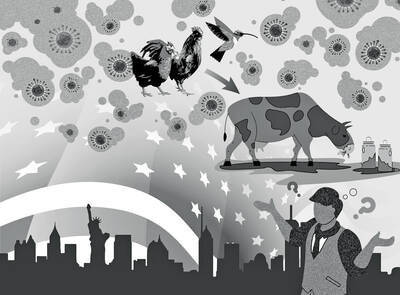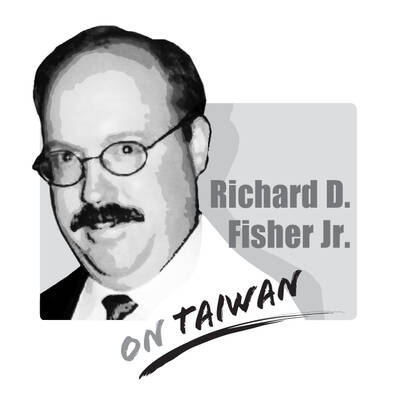The US’ youngest-ever elected president, John F. Kennedy, put civic duty at the heart of his 1961 call to “ask what you can do for your country.” Today’s leaders are trying to drum up the same spirit among young people, especially in Europe where the war in Ukraine has 40-something leaders such as Estonian Prime Minister Kaja Kallas extending conscription and French President Emmanuel Macron calling for civic rearmament.
However, let us not forget to ask older generations, such as the retiring baby-boomer cohort that might have grown up listening to Kennedy’s speech, to do their bit. They are also likely to need to accept sacrifices as the era of the “peace dividend” gives way to a paradigm shift in defense investment that could saddle G7 countries with an extra US$10 trillion in spending by 2034.
The narrative of generational inequality is well-traveled, with stacks of books telling how boomers bequeathed misery to their millennial children. Saddled with student debt, the young suffered stagnating wages and were denied the rites of passage of home ownership and parenthood while their own parents accumulated wealth.

Illustration: Mountain People
It is a narrative that has slightly softened in the past few years as wages rise, unemployment falls and overvalued houses become a bit more affordable.
Yet the UK and continental Europe’s generational divides still look very stark after the COVID-19 pandemic and as the Ukraine war grinds on. Young workers who became a hot commodity after lockdown face a cooling labor market and stalling economic growth, even as talk of rearmament delivers record orders for the likes of Germany’s Rheinmetall AG and brings military service back to dinner-table conversation.
Home-ownership levels have started to bounce back, but not enough to close the generational divide. Declining birthrates also highlight how having children is increasingly a choice seen as unaffordable by millennials.
Meanwhile, social spending is still geared toward the retirees and boomers who were most protected during the pandemic and who have the most wealth, which partly explains why cruise ships are bracing for another record-breaking year. In the UK, pension protections such as the triple lock and cuts to working-age benefits collectively mean non-pensioners are more than £2,200 (US$2,736) a year worse off on average since 2010, while pensioners are less than £200 a year worse off, the Resolution Foundation has said.
In France, despite Macron’s abortive attempts to rebalance taxation in favor of workers, pensioners had a better standard of living than workers going into the pandemic.
At a time when extra military spending is rekindling the “guns or butter” question — namely, at what point governments will have to cut social spending to fund defense — it should again be asked whether all generations are ready to make sacrifices. Capping or curbing overall welfare spending will not make the system fairer for those who governments are trying to persuade to don military fatigues or reverse declining birthrates; boomers would still be the net beneficiaries.
Even without adding defense into the mix, the implied future cost of payouts such as pensions is rising from one generation to the next: This “intertemporal budget gap” stood at 251 percent of GDP for the EU in 2019, a European Commission paper said.
Shifting to a pro-youth playbook means reallocating priorities: making homes more affordable, by expanding supply and not just subsidizing an unequal market; encouraging parenthood by expanding childcare, but also creating more jobs that do not discriminate against parenthood; prioritizing education and research; and lump-sum payments to young people instead of ring-fencing pension payouts.
“Pensioners have a higher standard of living than workers... They should be made to pay,” Jacques Attali, 80, former adviser to former French president Francois Mitterrand, said last week.
Pundits are likely to reply, with some justification, that pro-youth policies are not implemented because young people do not vote.
Yet wars transform societies. They create political awakenings, lead to better-organized societies and fund discoveries such as penicillin or the Internet — offset, of course, by the death and violence they cause.
Latvian Prime Minister Evika Silina recently told the Munich Security Conference that, after Russia’s annexation of Crimea, her country’s subsequent ramping-up of defense spending had been “easy to explain,” even if the preference would have been to focus on making pensions more generous.
This is a time of collective action, and the spirit of Kennedy’s quote should live on — all the more so as US President Joe Biden, the oldest leader in the country’s history, prepares to take on a fellow boomer, former US president Donald Trump.
Lionel Laurent is a Bloomberg Opinion columnist writing about the future of money and the future of Europe. Previously, he was a reporter for Reuters and Forbes.
This column does not necessarily reflect the opinion of the editorial board or Bloomberg LP and its owners.

The bird flu outbreak at US dairy farms keeps finding alarming new ways to surprise scientists. Last week, the US Department of Agriculture (USDA) confirmed that H5N1 is spreading not just from birds to herds, but among cows. Meanwhile, media reports say that an unknown number of cows are asymptomatic. Although the risk to humans is still low, it is clear that far more work needs to be done to get a handle on the reach of the virus and how it is being transmitted. That would require the USDA and the Centers for Disease Control and Prevention (CDC) to get

For the incoming Administration of President-elect William Lai (賴清德), successfully deterring a Chinese Communist Party (CCP) attack or invasion of democratic Taiwan over his four-year term would be a clear victory. But it could also be a curse, because during those four years the CCP’s People’s Liberation Army (PLA) will grow far stronger. As such, increased vigilance in Washington and Taipei will be needed to ensure that already multiplying CCP threat trends don’t overwhelm Taiwan, the United States, and their democratic allies. One CCP attempt to overwhelm was announced on April 19, 2024, namely that the PLA had erred in combining major missions
As Maldivian President Mohamed Muizzu’s party won by a landslide in Sunday’s parliamentary election, it is a good time to take another look at recent developments in the Maldivian foreign policy. While Muizzu has been promoting his “Maldives First” policy, the agenda seems to have lost sight of a number of factors. Contemporary Maldivian policy serves as a stark illustration of how a blend of missteps in public posturing, populist agendas and inattentive leadership can lead to diplomatic setbacks and damage a country’s long-term foreign policy priorities. Over the past few months, Maldivian foreign policy has entangled itself in playing
Former president Chiang Ching-kuo (蔣經國) used to push for reforms to protect Taiwan by adopting the “three noes” policy as well as “Taiwanization.” Later, then-president Lee Teng-hui (李登輝) wished to save the Chinese Nationalist Party (KMT) by pushing for the party’s “localization,” hoping to compete with homegrown political parties as a pro-Taiwan KMT. However, the present-day members of the KMT do not know what they are talking about, and do not heed the two former presidents’ words, so the party has suffered a third consecutive defeat in the January presidential election. Soon after gaining power with the help of the KMT’s